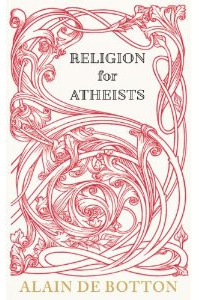
My review:
I read this book after noting that Alain de Botton is a very interesting person. He made this apparent to me in his book entitled “The Architecture of Happiness”. When I saw “Religion for Atheists” on the shelf, I just had to see what a person like Alain had to say about religion from an atheist’s perspective. I was not disappointed.
My first reaction was one of relief. Finally somone has sat down and said: “Religion merits our attention… for changing the world in a way that few secular institutions ever have”. This entire book discusses the benefits of religion, “what is beautiful, touching and wise” in them. It was a breath of fresh air to see religion praised so openly from an atheistic perspective. Basically, what Alain is trying to say is that when discarding faith, one should not throw the baby out with the bathwater: “Religions are intermittently too useful, effective and intelligent to be abandoned to the religious alone”. The take of religion on community, educating towards wisdom and not just knowledge, promoting kindness, promoting psychological health, promoting a realistic outlook on the inevitable hardships of life, and of course promoting a life of virtue is something that our current secular society is crying out for. In place of religion the great machine of capitalism and consumerism (and what naturally follows: hedonism) has awoken and is slowly destroying humanity and the fabric of societies (not to mention Mother Nature). Something needs to be done.
Having said this, I have to disagree with Alain’s optimism of taking out what is good from religion and incorporating into society. The secular world can’t agree on simple things let alone on what is good, bad, and what should be promoted. Yes, we can all agree that love is good, that kindness is good, that stealing is wrong. But there will always be a grey area where disagreements will occur. Always. If you do not see this, then you are either naive, immature, or both. Without authority, without some central point of reference (e.g. the Church) you will not be able to build anything lasting. Just take a look at how contemporary thinkers/philosophers can’t even agree on whether reality exists or not. And it is these thinkers/philosophers that Alain wants to elevate in society to a more prominent place because it is these that apparently can reflect on the more abstract (but not less practical) aspects of life – much like Plato’s philosopher kings.
Secular attempts at a “Religion of Humanity” will always fail. You don’t need to make an attempt of one to see this. You just need to note how, like I’ve said, the secular world can’t come to agree on simple things together let alone a grand attempt at a religious-like institution.
If you take God out of the picture, you’re not left with much but yourself. Neitzsche saw this. He took the secular/atheistic thought to its logical conclusion. But his world of selfishness and lack of compassion is terrifying (those that don’t think so, haven’t properly understood what Nietzsche was trying to say). It’s God or it’s nothing.
Which leads me to my final thought. If secular institutions are unable to agree on the more profound things perhaps there’s more to religion than Alain thinks. Is it possible that an institution like the Catholic Church could have survived this long and have stood firm in its teachings all this time and have withstood all the attacks on it and have survived with inhererntly flawed human beings at its helm for so long without there being some supernatural element to it? Could it be that the beauty and wisdom that Alain sees (to a small degree) in the Church has a supernatural source? There is so much of it, after all, as he admits. Perhaps if one were to dig a little further into this, one would see that there is even more beauty, wisdom, and love in the Church than Alain has put to paper here. And then, finally, after having an even broader perspective on the topic, one might then come to this conclusion that there just has to be a supreme, single, summit to which all this beauty points to and converges.
To be informed when new content like this is posted, subscribe to the mailing list: